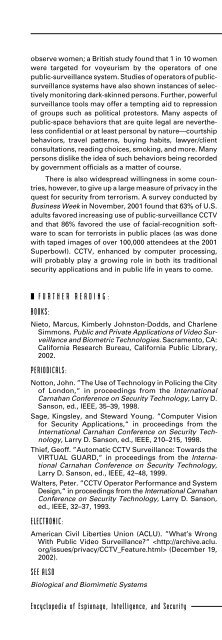ENCYCLOPEDIA OF Espionage, Intelligence, and Security Volume ...
ENCYCLOPEDIA OF Espionage, Intelligence, and Security Volume ...
ENCYCLOPEDIA OF Espionage, Intelligence, and Security Volume ...
You also want an ePaper? Increase the reach of your titles
YUMPU automatically turns print PDFs into web optimized ePapers that Google loves.
Coast Guard, United Statesobserve women; a British study found that 1 in 10 womenwere targeted for voyeurism by the operators of onepublic-surveillance system. Studies of operators of publicsurveillancesystems have also shown instances of selectivelymonitoring dark-skinned persons. Further, powerfulsurveillance tools may offer a tempting aid to repressionof groups such as political protestors. Many aspects ofpublic-space behaviors that are quite legal are neverthelessconfidential or at least personal by nature—courtshipbehaviors, travel patterns, buying habits, lawyer/clientconsultations, reading choices, smoking, <strong>and</strong> more. Manypersons dislike the idea of such behaviors being recordedby government officials as a matter of course.There is also widespread willingness in some countries,however, to give up a large measure of privacy in thequest for security from terrorism. A survey conducted byBusiness Week in November, 2001 found that 63% of U.S.adults favored increasing use of public-surveillance CCTV<strong>and</strong> that 86% favored the use of facial-recognition softwareto scan for terrorists in public places (as was donewith taped images of over 100,000 attendees at the 2001Superbowl). CCTV, enhanced by computer processing,will probably play a growing role in both its traditionalsecurity applications <strong>and</strong> in public life in years to come.❚ FURTHER READING:BOOKS:Nieto, Marcus, Kimberly Johnston-Dodds, <strong>and</strong> CharleneSimmons. Public <strong>and</strong> Private Applications of Video Surveillance<strong>and</strong> Biometric Technologies. Sacramento, CA:California Research Bureau, California Public Library,2002.PERIODICALS:Notton, John. ”The Use of Technology in Policing the Cityof London,“ in proceedings from the InternationalCarnahan Conference on <strong>Security</strong> Technology, Larry D.Sanson, ed., IEEE, 35–39, 1998.Sage, Kingsley, <strong>and</strong> Steward Young. ”Computer Visionfor <strong>Security</strong> Applications,“ in proceedings from theInternational Carnahan Conference on <strong>Security</strong> Technology,Larry D. Sanson, ed., IEEE, 210–215, 1998.Thief, Geoff. ”Automatic CCTV Surveillance: Towards theVIRTUAL GUARD,“ in proceedings from the InternationalCarnahan Conference on <strong>Security</strong> Technology,Larry D. Sanson, ed., IEEE, 42–48, 1999.Walters, Peter. ”CCTV Operator Performance <strong>and</strong> SystemDesign,“ in proceedings from the International CarnahanConference on <strong>Security</strong> Technology, Larry D. Sanson,ed., IEEE, 32–37, 1993.ELECTRONIC:American Civil Liberties Union (ACLU). ”What’s WrongWith Public Video Surveillance?“ (December 19,2002).SEE ALSOBiological <strong>and</strong> Biomimetic SystemsEncyclopedia of <strong>Espionage</strong>, <strong>Intelligence</strong>, <strong>and</strong> <strong>Security</strong>Bio-Optic Synthetic Systems (BOSS)Biosensor Technologies❚ CARYN E. NEUMANNCoast Guard (USCG),United StatesOne of the world’s leading maritime security forces, theUnited States Coast Guard (USCG), maintains public safetyin American ports <strong>and</strong> shipping lanes while also enforcinglaws against drug trafficking, environmental abuses, <strong>and</strong>illegal immigration. Created from a 1915 merger of the LifeSaving Service <strong>and</strong> the Revenue Cutter Service, the CoastGuard is unique among the nation’s armed services in thatit has two masters. The Coast Guard has historically beenattached to the U.S. Navy during times of war, but as ofMarch 1, 2003, the Coast Guard acts under the direction ofthe Department of Homel<strong>and</strong> <strong>Security</strong> (transferred fromthe Department of Transportation). The USCG plays amajor role in homel<strong>and</strong> security by screening passengerarrivals <strong>and</strong> conducting inspections at critical domesticports as well as engaging in patrols of the Americancoastline.The Coast Guard traces its origins to a 1790 act ofCongress authorizing the construction of vessels to enforcetariff <strong>and</strong> trade laws, prevent smuggling, <strong>and</strong> protectthe collection of the federal revenue. The Revenue CutterService that grew out of this order gradually assumed theadditional duties of derelict destruction, protection of game,<strong>and</strong> enforcement of environmental laws. When the RevenueCutter Service merged with the Life Saving Service,the newly formed USCG constituted a new branch of themilitary but a relatively poorly armed one. For most of itsexistence, the USCG has relied on light weapons thatcould be brought topside upon need while vessels operatinginl<strong>and</strong> generally had only small arms aboard. In war,USCG ships would add mounted guns, but such weaponryhas not been deemed necessary for the routine peacetimeactivities of combating smuggling, assisting ships in distress,<strong>and</strong> conducting patrols.The task assigned to the USCG is a daunting one.Over 95% of America’s overseas trade moves by seathrough 361 ports along 95,000 miles of coastline. It ismore economical to bring in drugs <strong>and</strong> other illegal productsin bulk by sea instead of by air, a fact that hasprompted numerous traffickers to try their luck at evadingthe Coast Guard. To combat maritime smuggling, theservice designed radar especially for marine traffic surveillance<strong>and</strong> control in 1972. At first, only operational inthe key ports of San Francisco, Houston, Galveston, NewOrleans, Puget Sound, <strong>and</strong> New York, radar is now commonlyused, but the chief counter-smuggling activity ofthe Coast Guard remains the patrol of American waters by221







![The Big Lie 9-11 and Government Complicity in Mass Murder [PDF]](https://img.yumpu.com/50957077/1/190x245/the-big-lie-9-11-and-government-complicity-in-mass-murder-pdf.jpg?quality=85)








